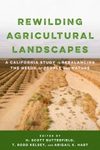About this book
We owe much of our economic prosperity to the vast forested landscapes that cover the earth. The timber we use to build our homes, the water we drink, and the oxygen in the air we breathe come from the complex forested ecosystem that many of us take for granted. As urban boundaries expand and rural landscapes are developed, forests are under more pressure than ever. It is time to forgo the thinking that forests can be managed outside of human influence, and shift instead to management strategies that consider humans to be part of the forest ecosystem. Only then can we realistically plan for coexisting and sustainable forests and human communities in the future.
In People, Forests, and Change: Lessons from the Pacific Northwest, editors Deanna H. Olson and Beatrice Van Horne have assembled an expert panel of social and forest scientists to consider the nature of forests in flux and how to best balance the needs of forests and the rural communities closely tied to them. People, Forests, and Change considers the temperate moist-coniferous forests of the US Pacific Northwest, but many of the concepts apply broadly to challenges in forest management in other regions and countries. In the US northwest, forest ecosystem management has been underway for two decades, and key lessons are emerging. The text is divided into four parts that set the stage for forests and rural forest economies, describe dynamic forest systems at work, consider new science in forest ecology and management, and ponder the future for these coniferous forests under different scenarios.
People, Forests, and Change brings together ideas grounded in science for policy makers, forest and natural resource managers, students, and conservationists who wish to understand how to manage forests conscientiously to assure their long-term viability and that of human communities who depend on them.
Contents
Preface
1. Introduction: The Human-Forest Ecosystem \ Deanna H. Olson, Beatrice Van Horne, Bernard T. Bormann, Paul D. Anderson, and Richard W. Haynes
Section I: Frameworks for Moist Temperate Forest Management
2. Setting the Stage: Vegetation Ecology and Dynamics \ Jerry F. Franklin, Frederick J. Swanson, and Thomas A. Spies
3. People and Forest Plants \ Susan Stevens Hummel and Jane E. Smith
4. Wood Products Markets, Communities, and Regional Economies \ Richard W. Haynes, Claire A. Montgomery, and Susan J. Alexander
5. An Ecosystem Services Framework \ Dale J. Blahna, Stanley T. Asah, and Robert L. Deal
Section II: Dynamic Systems as a New Paradigm
6. Ecosystem Services with Diverse Forest Landowners \ Robert L. Deal, Paul E. Hennon, David V. D’Amore, Raymond J. Davis, Jane E. Smith, and Eini C. Lowell
7. Patterns of Change across the Forested Landscape \ Raymond J. Davis, Andrew N. Gray, John B. Kim, and Warren B. Cohen
8. Learning to Learn: the Best Available Science of Adaptive Management \ Bernard T. Bormann, Byron K. Williams, and Teodora Minkova
9. The Emergence of Watershed and Forest Collaboratives \ Rebecca L. Flitcroft, Lee K. Cerveny, Bernard T. Bormann, Jane E. Smith, Stanley T. Asah, and A. Paige Fischer
Section III: Science-based Management: How Has New Science Shaped Our Thinking?
10. Silviculture for Diverse Objectives \ Paul D. Anderson and Klaus J. Puettmann
11. Long-term Forest Productivity \ Bernard T. Bormann, Steven S. Perakis, Robyn L. Darbyshire, and Jeff Hatten
12. Managing Carbon in the Forest Sector \ Mark E. Harmon and John L. Campbell
13. Biodiversity \ Deanna H. Olson, Brooke E. Penaluna, Bruce G. Marcot, Martin G. Raphael, and Keith B. Aubry
14. Aquatic-Riparian Systems \ Deanna H. Olson, Sherri L. Johnson, Paul D. Anderson, Brooke E. Penaluna, and Jason B. Dunham
15. Watersheds and Landscapes \ Gordon H. Reeves and Thomas A. Spies
Section IV: Alternative Futures for Coniferous Forests
16. Climate-Smart Approaches to Managing Forests \ John B. Kim, Bruce G. Marcot, Deanna H. Olson, Beatrice Van Horne, Julie A. Vano, Michael S. Hand, Leo A. Salas, Michael J. Case, Paul E. Hennon, and David V. D’Amore
17. Next-Generation Products and Greenhouse Gas Implications \ Eini C. Lowell, Vikram Yadama, Laurence R. Schimleck, and Kenneth E. Skog
18. Enhancing Public Trust in Federal Forest Management \ Michael Paul Nelson, Hannah Gosnell, Dana R. Warren, Chelsea Batavia, Matthew Betts, Julia I. Burton, Emily Jane Davis, Mark Schulze, Catalina Segura, Cheryl Ann Friesen, and Steven S. Perakis
19. Human-Forest Ecosystem Sustainability \ Deanna H. Olson, Beatrice Van Horne, Bernard T. Bormann, Robert L. Deal, and Thomas H. De Luca
20. Visions: 20 Years Hence \ Beatrice Van Horne, Deanna H. Olson, and Thomas Maness
List of Species
Glossary
Contributors
Index
Customer Reviews
Biography
Deanna H. Olson is a research ecologist with the USDA Forest Service Pacific Northwest Research Station in Corvallis, Oregon. Beatrice Van Horne is a research manager for the USDA Forest Service Pacific Northwest Research Station in Corvallis. Previously she was a professor of biology at Colorado State University in Fort Collins.




































